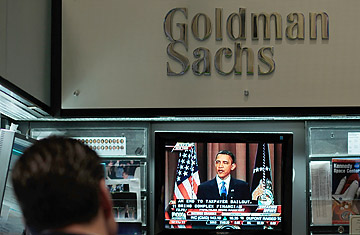
The conventional Beltway wisdom is that financial reform is definitely going to happen, but well-placed sources tell me ... Actually, well-placed sources tell me the same thing. Everyone in Washington seems sure that no one in Washington wants to look like a tool of Wall Street. So reform is supposedly unstoppable.
Last month, I was skeptical. But now that sources who are much closer to the process than I am and know much more about finance than I do assure me reform is inevitable. Well, I'm still skeptical.
It's mostly an Occam's razor thing. Every House Republican voted against the bill the House passed last year. Every Senate Republican signed a letter opposing the bill the Senate is debating now. Big Finance is spending $1.4 million a day to fight reform, with a lobbying army that includes 70 former Congressmen and just about everyone who ever staffed a congressional banking committee. It's certainly possible that Congress would resist all that pressure, and the same Republicans who marched in lockstep against health reform would stop blasting President Obama's socialism long enough to hand him another huge victory before the 2010 elections.
It just doesn't seem all that likely. Even if the Senate bill did attract 60 votes, it would have to be reconciled with the House bill, and then the House and Senate both would have to pass the reconciled bill — and all probably before the pre-election August recess, while dealing with a Supreme Court confirmation battle and jobs bills and whatever else comes down the pike. I'm not a Beltway insider anymore, but that sounds hard!
Congress is capable of doing hard things in an emergency, or when the ruling party desperately wants them done. But while financial reform will be vital in preventing another meltdown, it's not vital right now. The banking system has stabilized. America is no longer awash in irresponsible loans; right now the problem is getting a responsible loan. Passing strict reforms won't avert any imminent crisis; if anything, it could cause a crisis, if investors dump inflated financial stocks and create a market panic.
As for the ruling party, most Democrats do support reform. But few seem desperate to enact it and many would be delighted to spend the fall attacking Republicans for protecting the Wall Street status quo. Obama made it clear during the health debate that he would compromise on just about anything to get a bill, but he's been much pickier about financial reform, warning it would be unacceptable without an independent consumer agency, strict regulations for derivatives and so on. You'd expect him to sound uncompromising if his primary objective were firing up his base and daring Republicans to take unpopular stands; it's not necessarily what you'd expect if his primary objective were signing a bill into law this year.
My sources insist I just don't get it. Financial reform is a must-pass because nobody wants to be seen as a water carrier for the bazillionaires who broke the economy. That's why conservatives have been backing down from big fights and progressives have been winning battles to make the bill tougher.
Actually, I do get that politicians aren't going to make a case for coddling Wall Street. And I get that they aren't going to argue against the idea of reform; they'll at least go through the motions of a good-faith search for common ground before they regretfully say no. My question is whether they'll be able to devise alternative excuses for opposing reform that sound plausible enough to muddy the politics. It's a shame, because I generally support the reforms, but I can think of quite a few:
• It Doesn't Go Far Enough! Reasonable people can disagree about the best way to prevent another implosion, but I'd start with stricter capital requirements and leverage restrictions to rein in wild speculation by financial firms, who routinely relied on fragile overnight lending markets to finance bets 30 times the size of the assets that backed them. Unfortunately, the reforms won't fix this. The House bill does propose leverage limits, but otherwise Congress is largely sidestepping these issues. I'd also like to see limits on bank size, because banks can't get too big to fail if they can't get too big, but that didn't make it into the bills either. And I'd love to blow up the ratings agencies that regularly awarded AAA seals of approval to squadoosh, but the bills in Congress don't go that far.
